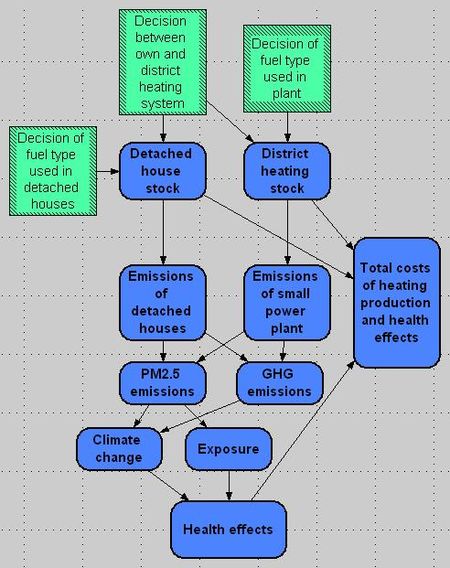BIOHER assessment
| Moderator:Nobody (see all) Click here to sign up. |
|
|
| Upload data
|
Bioher is a research project coordinated by National Institute for Health and Welfare (THL). The duration is 2008-2011. Project includes five subprojects with 1) measurement of PM and greenhouse gas emissions, 2) chemical characterization and assessment of atmospheric thermal impact of emitted PM, 3) toxicological characterization of emitted PM, 4) assessment of exposure to and health effects of current residential wood combustion, 5) assessment of health risks. This assessment page includes scope, definition, and result of health risk assessment of fine particles of four residential heating scenarios (more detailed later).
Scope
Purpose
The purpose is to evaluate PM2.5 and green house gas (GHG) emissions of detached houses and small heating power plant, to assess exposure and health effects due to evaluated emissions and to define emission, heating and health effect costs. Assessment is going to compare four alternative ways to arrange decentralised energy production in communities with 2000 - 10000 inhabitants: light oil and pellets as fuel of detached houses and heavy oil and wood chips as fuel of small heating plants. In addition, environmental effects i.e. climate change (CC) of PM2.5 and GHG emissions is assessed with this model.
Questions:
- What would be the health effects of PM2.5 emissions of small power plant and individual houses in small living area (2000- 10000 inh.)?
- What are GHG emissions of individual houses and small power plant and how emissions effect on CC?
- What are the costs of different alternatives?
- What is the optimal decision to produce energy and heat to houses?
Boundaries
- Energy production (single house and small energy plant level)
- Population (2000-10000 inh.)
- Exposure for PM2.5
- ER-functions for PM2.5
- PM2.5 emissions (->health effects)
- PM2.5 climate effect (-> health effects)
- Household heating scenarios:
- Heavy/ light oil, wood chips, pellets
- Atmospheric thermal impact
- DALY
- Impacts:
- Premature mortality
- Costs
Scenarios
Scenarios include two different fuel types of energy production in detached houses and small power plant:
Detached houses
- light oil
- pellets
Small power plant
- heavy oil
- wood chips
Intended users
- City-level policy-makers in all sectors in Kuopio as well as everywhere else
- International policy-makers related climate change
- Policy-makers related health risks of fine particles and green house gases
- General public
- Scientists working on health risks of fine particles, green house gases and climate change
- Other interested of topic
Participants
- Assessment and Modelling Unit of THL
- Jouni (as researcher in charge)
- Pauliina
- Virpi (CLAIH)
- Pasi (Emissions)
- Marko (role?)
- Other researchers related Bioher -project
Definition
Variables
Decision
- Decisions of citizen level between different heating systems
- District heating system (emissions from small power plant -> decisions of society level)
- Domestic combustion with pellets or heavy oil
- Decisions of society level
- Heating systems of households (distribution of district heating system)
- Fuel type of energy production (heavy oil/wood chips)
- Building stock (energy efficiency of buildings)
Building stock
- Detached buildings with own heating system
- Fuel type
- Energy efficiency
- Volume/area
- Need of energy
- Building with district heating system
- Energy efficiency
- Volume/area
- Need of energy
Emission
- Emissions of domestic combustion
- Emissions of small power plant
Exposure
- Population
- iF
- Breathing rate
- Concentration of PM2.5
Exposure-response (ER) function
- Long-term effects of exposure to PM2.5
- Cardiovascular ER (mortality/morbidity)
- Respiratory ER (mortality/morbidity)
- Cancer ER?
- Asthma ER
- Hospital admissions
Health effect
- Mortality/morbidity of population (2000-10000inh) caused by PM2.5 emissions of domestic heating production expressed as number of incidents
- Cardiovascular effects
- Respiratory health effects
- Cancer?
- Total premature mortality
- Asthma incidences
- Hospital admissions
Expenses
- Costs of energy production
- Costs of health effects
Climate change effect
- Positive effect (warming)
- CO2
- CH4
- N2O
- CFC
- NOx?
- H2O?
- Negative effect (cool down)
- PM2.5
- Albedo (soil surface, snow, clouds)
Analyses
- Cost-benefit and cost-effectiveness analyses
- value-of-information (VOI) analysis
Result
Conclusions
See also
- Bioher project page
- Claihassessment
